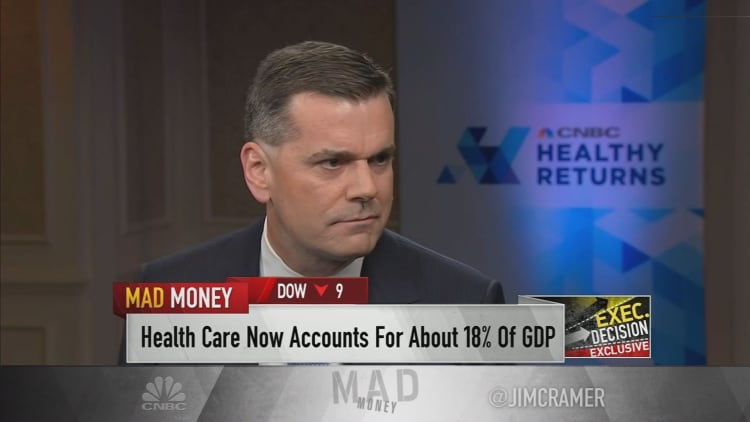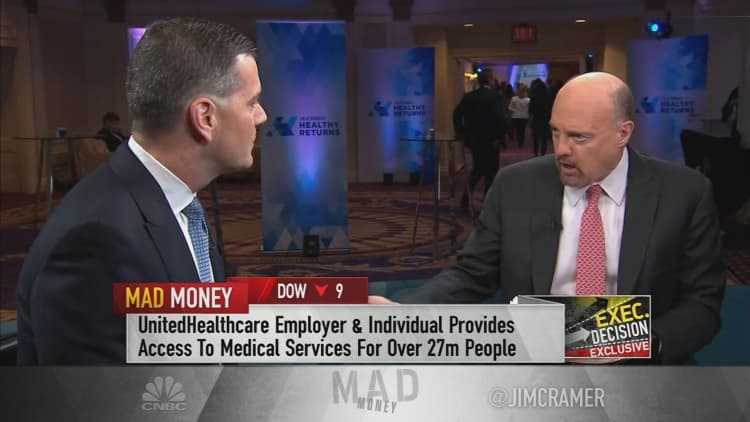
Even UnitedHealth Group's CEO, David Wichmann, acknowledges that the health-care juggernaut might not always have faster growth than that of the United States' gross domestic product.
"If you look forward to the future, call it seven, eight, nine, 10 years out, I think you're going to see the real strong implications of technology on helping to curtail health care costs," Wichmann told CNBC in a Wednesday interview with "Mad Money" host Jim Cramer.
Speaking from CNBC's Healthy Returns conference, Wichmann envisioned a future where tech advances would streamline health care to the point where the industry would hinge more on value than on profits.
"I think the systems of the benefits and the health systems broadly going to more value-based mechanisms will drive greater efficiency and effectiveness in health care," the CEO said.
The Minnesota-based UnitedHealth is a giant network of health-care professionals that offers products and insurance plans to millions of U.S. consumers.
Wichmann emphasized to Cramer that the company is already working on improving its efficiency by leveraging Optum, its tech-enabled health services business that has a massive bank of data.
Wichmann said Optum has "data around 200 million people on the administrative side, and then another 100 million or so in terms of medical records."
"That is used by us for A.I., machine learning, advancing ... technologies broadly in health care and making a difference on the predictive values of understanding who may get sick and under what circumstances we need to help them with their care," the CEO continued.
Wichmann saw the company's five main focus areas — health care delivery, pharmaceutical services, consumer-centric benefits, digitizing health information and global access — as key drivers in the shift to more efficient health-care services.
Admitting that "drug prices are too high," Wichmann pointed to UnitedHealth's efforts to make pharmaceuticals more affordable for everyday consumers through point-of-service discounts.
"Over time, I think it'll continue to get greater levels of attention," the CEO said. "We saw yesterday that Aetna also adopted a similar policy and hopefully the rest of the industry finds its way to that same position."
Slashing unnecessary costs would also be Wichmann's first course of action if he were given the keys to the entire U.S. health-care system, he told Cramer.
"The first thing I'd do is there's about a trillion dollars of cost that's in the fee-for-service system today that's largely unmanaged. There is no question we could do a better job with that in terms of just applying practical, private company practices to that population and I think we'd save a lot there," Wichmann said.
"I'd also have everybody kind of get focused on a similar mission and drive a culture to improve health care costs by lowering them, drive greater levels of effectiveness overall and making sure that we are driving a great deal of consumer satisfaction."
Watch David Wichmann's full interview here:

Questions for Cramer?
Call Cramer: 1-800-743-CNBC
Want to take a deep dive into Cramer's world? Hit him up!
Mad Money Twitter - Jim Cramer Twitter - Facebook - Instagram - Vine
Questions, comments, suggestions for the "Mad Money" website? madcap@cnbc.com



